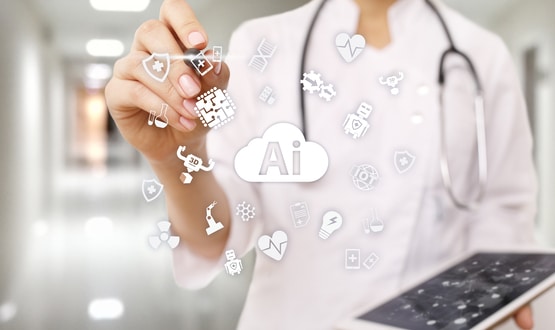icometrix and Queen Mary University explore AI tech for MS scans
- 7 March 2023

A collaboration involving icometrix and Queen Mary University of London exploring how AI can be applied to MRI scans to improve the care of patients with multiple sclerosis, has received support from an AI Award.
The AssistMS programme is a collaboration between icometrix, Queen Mary University of London (QMUL), the University of Nottingham plus Barts Health and Nottingham University Hospitals Trusts.
AssistMS will investigate the impact of AI applied to MRI on the decision-making, clinical outcomes and health economics in the care of people with multiple sclerosis (MS). It will be supported by an AI Award from the National Institute of Care & Health Research (NIHR).
The programme will focus on the reporting of MRIs, which are used to assess whether disease-modifying treatments are working or not. Typically, these can be time-consuming and tiring, meaning they are prone to human error.
icobrain ms, the software tested in AssistMS, works to detect and highlight subtle changes on MRI brain scans and then provides summary reports. By using AI to analyse the brain scans, neurologists will have access to a more accurate idea of how patients’ MS is progressing. This allows them to make the best possible treatment decisions for individuals.
Dr Ashok Adams, consultant neuroradiologist at Barts Health, said: “Support for AssistMS will be invaluable to us as a neuroimaging department as it will help with the accurate evaluation of scans in order to guide patients’ therapy.
“This is at a time when imaging departments are under increased pressure to provide timely imaging and scan reports.”
During the AssistMS project, clinicians will perform their assessments both with and without the support of icobrain ms. The accuracy and consistency of the AI tool will be studied using around 1,300 MS patients in east London and Nottingham.
It will also investigate the impact of the technology on clinical decisions, and explore the economic value of it.
Nikos Evangelou, professor of neurology at the University of Nottingham and honorary consultant Neurologist at Nottingham University Hospitals NHS Trust, said: “As part of monitoring patients with multiple sclerosis, we do lots of MRI scans of the brain. Checking, measuring and comparing scans with those taken in the previous years can take a long time.
“We hope with this study we will learn how to use ‘cutting edge technology for automatic scans reading’ to help us to treat our patients appropriately, having all the information we need.”
The AssistMS project is also supported by the East Midlands Imaging Network (EMRAD), InHealth Group and the MS Society of Great Britain & Northern Ireland. The project will start in the coming months and will run for three years.



